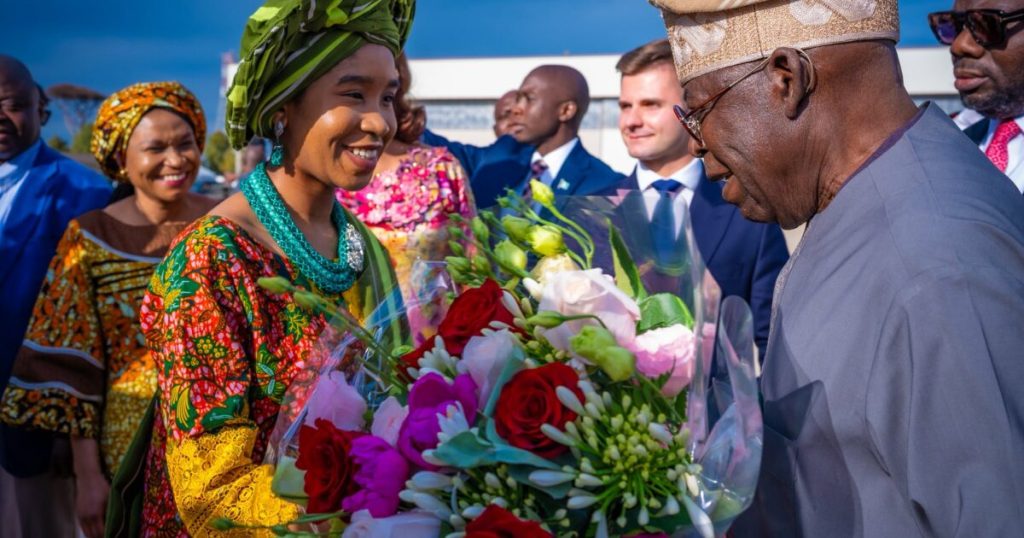President Bola Tinubu’s visit to Rome signifies a momentous occasion, marked by the convergence of political and religious leadership on the world stage. His presence at the installation mass of Pope Leo XIV underscores not only the deep-rooted connection between Nigeria and the Catholic Church but also the global recognition of Tinubu’s leadership in a world grappling with numerous challenges. The invitation extended by the Vatican, emphasizing the “particular importance” of Tinubu’s attendance, highlights the significance of this event for both the Catholic Church and the broader international community. The Pope’s personal connection to Nigeria, having served in Lagos during the 1980s, further strengthens the bond between the two entities and adds a layer of personal resonance to the occasion.
The President’s participation in this historic event transcends mere diplomatic protocol. It symbolizes a shared commitment to addressing the pressing issues that afflict the world today, including political tensions, social conflicts, and humanitarian crises. The Papal invitation, conveyed by Cardinal Pietro Parolin, underscores the Vatican’s recognition of Tinubu’s potential role in contributing to global peace and stability. By attending the installation mass, Tinubu demonstrates his willingness to engage with religious leaders and institutions in the pursuit of common goals, fostering dialogue and collaboration across diverse spheres of influence. This interaction between political and religious leaders holds the potential to bridge divides and promote understanding in a world increasingly fractured by ideological and cultural differences.
The composition of President Tinubu’s entourage further emphasizes the importance of this visit for Nigeria’s Catholic community. The presence of prominent figures such as Archbishop Lucius Ugorji, President of the Catholic Bishops’ Conference of Nigeria, Archbishops Ignatius Kaigama and Alfred Martins, and Bishop Mathew Hassan Kukah, reflects the strong representation of the Nigerian Catholic Church at this significant event. Their inclusion underscores the deep ties between the Nigerian government and the Catholic Church, and highlights the role of faith in shaping Nigeria’s social and political landscape. The participation of these religious leaders symbolizes the unity and solidarity of the Nigerian Catholic community in celebrating the new Pope and reaffirming their commitment to the values and teachings of the Church.
The timing of this event, in a world grappling with a multitude of crises, underscores the importance of dialogue and cooperation between different spheres of influence. The installation of a new Pope represents a pivotal moment for the Catholic Church, a time for reflection, renewal, and a reaffirmation of its mission in the world. President Tinubu’s presence at this critical juncture signifies his recognition of the Church’s influence and its potential to contribute to positive change. His participation offers an opportunity for dialogue and collaboration on issues of mutual concern, fostering a spirit of partnership in addressing global challenges and promoting peace and reconciliation.
The warm reception accorded to President Tinubu upon his arrival in Rome, including the presence of Ambassador Bianca Odumegwu-Ojukwu and officials from both the Vatican and the Nigerian Embassy, reflects the importance attached to his visit. The meticulous arrangements made to welcome the President and his delegation underscore the respect and recognition afforded to him by both the Italian government and the Vatican. This cordial reception sets the stage for productive interactions and fruitful discussions during the President’s stay in Rome. The presence of high-ranking officials from both sides signifies the mutual desire to strengthen bilateral relations and deepen cooperation on various fronts.
In conclusion, President Tinubu’s journey to Rome for the installation mass of Pope Leo XIV represents a significant moment in the intersection of political and religious leadership. It underscores the importance of dialogue, cooperation, and shared commitment to addressing global challenges. The Pope’s personal connection to Nigeria, the presence of prominent Nigerian Catholic leaders in the President’s entourage, and the warm reception he received in Rome all contribute to the significance of this event. This visit holds the potential to foster stronger ties between Nigeria and the Vatican, and to contribute to a broader dialogue on peace, justice, and understanding in a world in need of healing and reconciliation.














